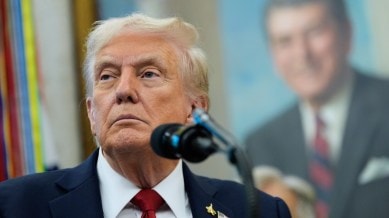Trump declares Caribbean drug cartels unlawful combatants: Here is what it means
The move comes after the US military last month carried out three deadly strikes against alleged drug smuggling boats in the Caribbean.

President Donald Trump has declared that drug cartels operating in the Caribbean are unlawful combatants. He also said that the United States is now in a “non-international armed conflict.”
A US official familiar with the matter told The Associated Press on Thursday that Congress was notified about the designation by Pentagon officials on Wednesday.
Who is an unlawful combatant?
International law defines an unlawful combatant as an individual who directly participates in armed conflict but does not meet the criteria of a lawful combatant, such as being part of a recognized army or militia.
In the US, Taliban and Al Qaeda members captured after the 9/11 attacks were previously designated as unlawful combatants.
US attacks on alleged drug trafficking boats
The move comes after the US military last month carried out three deadly strikes against alleged drug smuggling boats in the Caribbean. At least two of those operations were carried out on vessels that originated from Venezuela.
Trump admin declared cartels as terrorist organisations
In February, the Trump administration had designated eight Latin American criminal and drug-trafficking groups as “global terrorist organisations.” This included Tren de Aragua in Venezuela, MS-13 in El Salvador and six groups based in Mexico – the Gulf Cartel, the Jalisco New Generation Cartel, the Northeast Cartel, the New Michoacan Family and the United Cartel.
The Trump administration argued that the international connections and operations of the groups, including drug trafficking, migrant smuggling and violent pushes to extend their territory, warrant the designation.
DOJ closing task force took on drug cartels
In a related development, Reuters reported that the US Justice Department is closing a task force that took on drug cartels and an office that aimed to ease racial tensions, in a reorganization that drops a plan to merge the nation’s top drug and gun law enforcement agencies. The most sweeping reorganization of the DOJ in two decades, which Attorney General Pam Bondi approved in September, will cut about 275 positions, leading to the elimination of or involuntary re-assignment of about 140 employees, the documents show.
“Reduction in force” letters to employees whose roles will be affected in the units that are to be closed were due to be sent out earlier this week, other government documents seen by Reuters showed.
The DOJ said the changes are designed to “promote efficiencies and effective governance,” the documents show. The plan has drawn criticism from congressional Democrats and from former department employees, who say it could hurt critical work.
The documents do not include a plan, first reported in March, to merge the Drug Enforcement Administration and the Bureau of Alcohol, Tobacco, Firearms and Explosives. That idea faced a bipartisan backlash in Congress, as well as resistance from DEA and ATF employees and opposition from both gun control and gun rights organizations. It was not clear whether the merger could be reconsidered at a future time.
The plan approves closing the Organized Crime Drug Enforcement Task Forces, a prosecutor-led inter-agency office created in the 1980s during Ronald Reagan’s presidency to tackle major drug cartels.
It also shutters the Community Relations Service, an office that for 60 years has helped mediate racial and ethnic tensions across the United States, and a unit that helps ensure Americans have access to legal aid known as the Office for Access to Justice, the documents show. In addition, it merges the Tax Division into the department’s Criminal and Civil divisions, in a move that will cost at least $3.1 million.